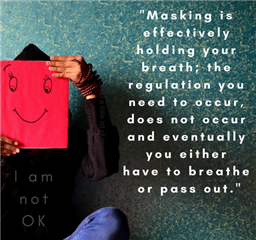Hi all
I’m Catherine, a recently diagnosed high functioning autistic in the UK.
Sought private diagnosis aged forty two after a sustained period of burnout having always been a bit “other”. I most definitely heavily mask as a senior public facing healthcare professional, trained to put others’ wellbeing at the forefront of my mind.
I’ve just started a new job and wonder if anyone has any experience in how to navigate being autistic and unmasking? I’m an expert in “fitting in” but am desperate not to repeat previous patterns (which ultimately leads to stress, burnout and changing jobs). I have considered whether this career is suitable longer term but there are many aspects I love and a move isn’t an option immediately. As a highly logical female I’m often perceived as brash, a smartarse or insensitive and ideally would like to be more authentic opposed to hiding my intelligence and directness. Does anyone have experience with similar? I absolutely don’t wish to offend anyone but result in losing myself in a bid to please others!
Appreciate any comments or sharing of experiences particularly in relation to managing professional lives.
Catherine




